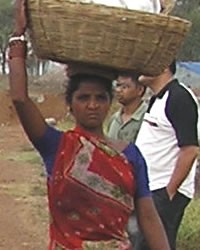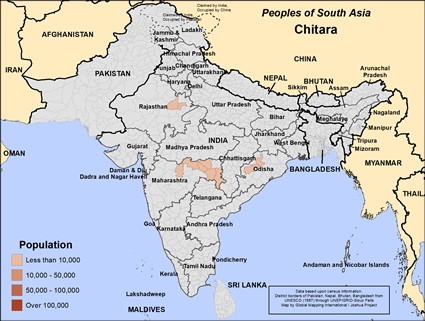Chitara in India

Photo Source:
Jaba Steen
|

Map Source:
People Group data: Omid. Map geography: UNESCO / GMI. Map Design: Joshua Project
|
| People Name: | Chitara |
| Country: | India |
| 10/40 Window: | Yes |
| Population: | 5,400 |
| World Population: | 5,400 |
| Primary Language: | Odia |
| Primary Religion: | Hinduism |
| Christian Adherents: | 0.00 % |
| Evangelicals: | 0.00 % |
| Scripture: | Complete Bible |
| Ministry Resources: | Yes |
| Jesus Film: | Yes |
| Audio Recordings: | Yes |
| People Cluster: | South Asia Hindu - other |
| Affinity Bloc: | South Asian Peoples |
| Progress Level: |
|
Introduction / History
The Hindu Chitara people have a rich history in India, especially in the western regions like Gujarat. They are traditionally known for their skills in painting and craftsmanship. The Chitara primarily speak Gujarati.
What Are Their Lives Like?
Today, the Hindu Chitara people live in rural and semi-urban areas, engaging in traditional painting, crafts, and small-scale agriculture. They create intricate artwork, often depicting religious and cultural themes. Many families also cultivate crops such as millet, wheat, and vegetables. Their communities are close-knit, emphasizing strong family bonds and mutual support. Despite economic challenges, the Chitara maintain a vibrant cultural life, celebrating their heritage through local festivals, music, and traditional arts.
The Hindu Chitara people distinguish themselves from other groups through their unique skills in traditional painting and craftsmanship. Their intricate artwork and cultural expressions set them apart from neighboring communities. The Chitara place a strong emphasis on maintaining family unity.
The Chitara's eating practices involve a diet primarily based on vegetarian food, including rice, lentils and vegetables with a variety of spices. They also enjoy traditional sweets and festive foods during celebrations. Their culinary practices emphasize simplicity and the use of locally available ingredients.
Their wedding practices are elaborate and rooted in Hindu tradition. Weddings typically include rituals such as the exchange of garlands, sacred fire ceremonies, and vibrant music and dance performances.
What Are Their Beliefs?
The Chitara people practice Hinduism, worshiping various deities and observing numerous religious rituals and festivals such as Diwali, Navratri and Holi. Their belief system emphasizes values like dharma (duty), karma (actions and consequences), and ahimsa (non-violence). They honor their ancestors through rituals and ceremonies, ensuring the transmission of their religious and cultural traditions across generations.
What Are Their Needs?
The Hindu Chitara people need better access to quality education to provide more opportunities for their children. Improved healthcare services are essential due to limited availability of medical facilities and high rates of preventable diseases. Economic support through modern techniques in painting and crafts, market access, and vocational training can enhance their livelihoods. Infrastructure development, including better roads, clean water supplies, and reliable electricity, will greatly benefit the Chitara community. Addressing these needs will help the Chitara people achieve greater socio-economic stability while preserving their rich cultural and religious heritage.
Prayer Points
Pray for an abundant blessing of Chitara families and communities as they embrace Jesus Christ, the Lord of lords.
Pray for a movement to Christ that will enrich the Chitara community.
Pray for spiritual openness to Jesus Christ that will not be hindered by the false belief in religious institutions rather than the person, Jesus Christ.